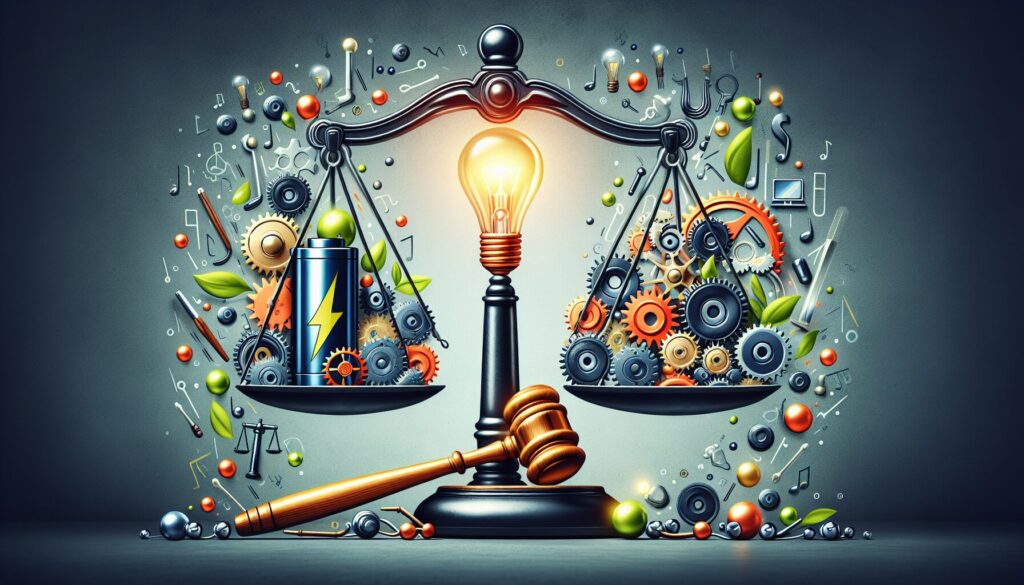Hey there, my tech-savvy friends! Let’s dive into the fascinating world of solid-state batteries. Imagine you’re opening up a magical box of energy storage, where everything inside screams efficiency and innovation. Solid-state batteries are like the cool new kids on the block, ready to revolutionize how we power everything from electric vehicles to our beloved gadgets. They replace the liquid or gel electrolyte found in traditional batteries with a solid electrolyte, which means they’re safer and can store more energy. I remember when I first stumbled upon the term “electrochemical stability window”—I was hooked! This basically refers to the voltage range within which the battery operates without decomposing. And guess what? Solid-state batteries have a wider range! They’re also great at suppressing dendrites, those pesky little structures that can cause batteries to short-circuit. Exciting stuff, right? ISO 6469-1 compliance ensures these batteries meet international safety standards, making them a fantastic choice for the future of energy.
Related: Everything You Need to Know About Solid-State Batteries in Electric Cars
Current Legal Framework in Pakistan
Alright, so let’s dive into the current legal framework for solid-state batteries in Pakistan. You know, this topic reminds me of a chat I had with a friend who’s really into tech innovation. We were discussing how solid-state batteries, with their solid electrolytes and enhanced safety features, are like the future of battery technology. These batteries are designed to minimize thermal runaway risks and suppress those pesky lithium dendrites that can cause all sorts of trouble. However, understanding the legal landscape is crucial for anyone wanting to explore this field in Pakistan.
At present, Pakistan is in the early stages of establishing specific laws for solid-state battery technology. The legal framework is largely influenced by general energy and environmental regulations. The Pakistan Environmental Protection Agency plays a significant role here. They’re responsible for ensuring that any new technology, including advanced battery systems, meets environmental standards. But there’s a catch! The current regulations don’t specifically target solid-state batteries, which means there’s a bit of a gray area.
However, this doesn’t mean it’s a free-for-all. Companies interested in developing or importing solid-state batteries must comply with existing laws related to energy products. For example, they must adhere to the guidelines set by the Alternative Energy Development Board. This involves meeting safety standards and ensuring that their operations don’t harm the environment. Additionally, any solid-state battery initiative would need to align with Pakistan’s broader energy policies, focusing on sustainability and innovation.
Moreover, as the global push towards clean energy grows, it’s likely that Pakistan will soon develop more targeted regulations. This will help in fostering a supportive ecosystem for solid-state battery technology. Until then, keeping an eye on policy updates from these regulatory bodies is essential for anyone involved in this exciting field.
Impact of Regulations on Innovation

When it comes to innovation in solid-state battery technology, regulations play a pivotal role in shaping the landscape. In Pakistan, the regulations set by the Pakistan Standards and Quality Control Authority significantly influence how innovations are developed and implemented. For those of us who geek out over technical details, you’ll know that Electrochemical Impedance Spectroscopy is crucial in analyzing the Solid Electrolyte Interphase (SEI) layer. This analysis is essential for ensuring the safety and efficiency of these batteries. But how do these regulations impact innovation?
First off, regulations ensure that innovations meet safety and quality standards. This is vital for consumer trust and widespread adoption. Moreover, they help in standardizing processes, making it easier for companies to bring their products to market. However, it’s also true that stringent regulations can sometimes slow down the pace of innovation. Companies may face challenges in adapting rapidly to new guidelines, which could delay the introduction of groundbreaking technologies. Therefore, a balance is needed between ensuring safety and fostering an environment where creativity thrives.
Encouraging Research and Development
Additionally, these laws can drive research and development by setting clear benchmarks. Innovators are motivated to meet or exceed these standards, pushing the boundaries of what’s possible. For instance, local universities and research institutions often collaborate with industry experts to explore new materials and design methodologies. This collaboration is key to overcoming challenges associated with solid-state batteries, like improving energy density and reducing costs. According to Dawn, Pakistan’s focus on renewable energy is expected to increase the demand for advanced battery technologies. As a result, regulations will need to evolve to accommodate these advancements, ensuring they remain relevant and supportive of innovation.
Safety Standards and Compliance
You know, diving into the world of solid-state batteries is like exploring a new frontier in technology! One of the most fascinating parts is understanding the safety standards and compliance requirements in Pakistan. Safety is a huge deal, whether you’re tinkering with gadgets at home or developing cutting-edge technology. When it comes to solid-state batteries, ensuring safety means looking into things like electrochemical impedance spectroscopy. This technique is essential for analyzing battery health and predicting performance. It’s kind of like having a crystal ball for your battery’s future!
Now, let’s talk about compliance. Pakistan aligns its regulations with international standards to ensure safety and reliability. This includes rigorous testing protocols. For instance, state-of-charge estimation algorithms are crucial. They help in predicting the amount of charge left in a battery, which is vital for preventing overcharging and potential hazards. Isn’t it amazing how technology can help keep things safe and sound?
Local Compliance and Global Standards
In Pakistan, the Ministry of Science and Technology closely monitors battery compliance. They work in tandem with Pakistan Standards and Quality Control Authority to ensure that the products meet the necessary safety benchmarks. It’s comforting to know that there are dedicated bodies ensuring the batteries we use are up to the mark.
Moreover, recycling protocols for lithium-ion cells are becoming increasingly important. These protocols help in managing waste and reusing valuable materials. It’s a great step towards sustainability. If you’re curious about how these technologies fit into the bigger picture of electric vehicles, you might want to check out our detailed exploration of solid-state batteries in electric cars. It dives deep into the nitty-gritty of how these batteries are revolutionizing the automotive industry.
Furthermore, organizations like National Electric Power Regulatory Authority (NEPRA) play a role in setting the guidelines that manufacturers must follow. It’s all about creating a safe environment for innovation. Compliance isn’t just about following rules; it’s about ensuring that these innovative technologies are safe, reliable, and beneficial for everyone. Don’t you just love how a little bit of science and regulation can make our lives better and safer?
Environmental Considerations

Environmental considerations are a big deal when it comes to solid-state batteries in Pakistan. I remember chatting with a friend who works in battery tech; he was super excited about the potential of solid-state batteries to reduce our carbon footprint. These batteries use a solid electrolyte interface, which is less harmful to the environment than the liquid electrolytes in traditional batteries. This is particularly beneficial because it minimizes the risk of leakage and contamination. Plus, they’re known for better dendrite suppression techniques, which is a fancy way of saying they can prevent those pesky metal filaments that cause short circuits.
However, the production and disposal of these batteries still raise some environmental concerns. The extraction and processing of lithium, often used in the lithium metal anode, can be resource-intensive. It’s crucial to follow strict safety standards to mitigate these impacts. In Pakistan, regulations are being developed to ensure that manufacturers adhere to environmentally friendly practices. This includes proper recycling methods to prevent hazardous waste.
Local Impact and Initiatives
In our own backyard, organizations like `Pakistan Council of Scientific and Industrial Research` are playing a pivotal role. They’re researching sustainable battery technologies to lessen environmental harm. Additionally, collaborations with international bodies such as `International Renewable Energy Agency` are helping to align local laws with global standards. These efforts are vital for ensuring that the transition to solid-state batteries benefits both our energy needs and the environment. Therefore, as these technologies advance, it’s important to keep an eye on how they’re regulated and the role they play in our sustainable future.
Future Outlook for Solid-State Batteries
Imagine a world where your smartphone charges in minutes and electric vehicles travel further on a single charge. Fascinating, right? That’s the magic of solid-state batteries! These batteries use solid electrolytes instead of liquid ones. This change boosts safety and energy density. The solid-state electrolyte conductivity standards ensure these batteries perform efficiently. In Pakistan, the focus on these standards is growing as the country aims to keep pace with global tech advances.
However, there’s more to the story. Safety is a big deal, especially with the lithium metal anode. This component can be tricky, as it tends to form dendrites, which are tiny, tree-like structures that can cause short circuits. Following lithium metal anode safety protocols is crucial to prevent such issues. Moreover, compliance with ISO/IEC 62660-3:2016 ensures these batteries meet international safety and performance requirements. It’s exciting to see how these technical aspects are setting the stage for the future of energy storage in Pakistan.
Potential Growth and Challenges
The shift towards solid-state batteries could transform various sectors in Pakistan, from consumer electronics to transportation. But, it’s a journey filled with challenges. The cost of production is currently high, which can slow down widespread adoption. However, as technology advances and economies of scale kick in, prices are expected to drop. Furthermore, local manufacturing could play a significant role in making these batteries more accessible. Industry experts are hopeful, predicting that with the right policies and investments, Pakistan could become a hub for solid-state battery innovation. Organizations like `Pakistan Council of Scientific and Industrial Research` and `Alternative Energy Development Board` are pivotal in driving this change. As we look ahead, the future seems bright for solid-state batteries, promising significant advancements in energy efficiency and safety.
Conclusion
To sum up, solid-state batteries represent a significant leap forward in energy storage technology, promising enhanced safety, higher energy density, and environmental benefits. As Pakistan navigates the evolving regulatory landscape, the focus on aligning with global standards and fostering innovation will be crucial for capitalizing on this exciting technology. With ongoing research and development, the country is well-positioned to become a key player in the solid-state battery sector, paving the way for a more sustainable and efficient future. Here’s to powering up a brighter tomorrow!
Continue Exploring
Unleash the future of electric driving with groundbreaking advancements in solid-state battery technology. Discover why these innovations are set to revolutionize the automotive world and power your journey into tomorrow.
Frequently Asked Questions
What are the current regulations for solid-state batteries in Pakistan?
As of now, Pakistan is in the process of developing comprehensive regulations for solid-state batteries. The government is focusing on aligning local laws with international standards to ensure safety and efficiency in the adoption of this technology. Existing laws are primarily focused on the import, manufacturing, and environmental impact of battery technologies.
How does the government of Pakistan support the development of solid-state battery technology?
The government of Pakistan is actively supporting the development of solid-state battery technology through various initiatives. These include research grants, partnerships with international technology firms, and incentives for local manufacturers. The aim is to foster innovation and make Pakistan a hub for advanced battery technologies.
Are there any environmental regulations for the disposal of solid-state batteries in Pakistan?
Yes, Pakistan has environmental regulations in place for the disposal of all types of batteries, including solid-state batteries. These regulations are designed to minimize environmental impact and promote recycling. Companies are required to follow strict guidelines for the safe disposal and recycling of battery components to prevent pollution and resource wastage.


Leave a Reply